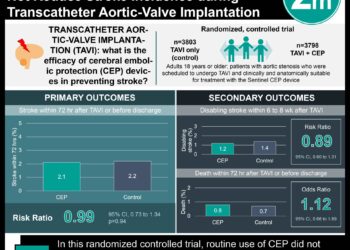Partner bereavement linked to increase acute cardiovascular events
Image: PD
1. Partner bereavement was associated with increased risk of stroke and MI within the first 30 days in an older population.
Evidence Rating Level: 2 (Good)
Study Rundown: Psychosocial stressors are known to be associated with acute cardiovascular events. In fact, a 2008 study in the New England Journal of Medicine links even the stress of watching soccer to increased cardiovascular events.
In this study, the authors examined the effects of bereavement on acute cardiovascular events. In this matched cohort study using The Health Improvement Network (THIN), a primary care database in the UK, the researchers found that the death of a partner among older individuals significantly increased the risk of having a stroke or myocardial infarction (MI) within the first 30 days. The strengths of the study include the large sample population (n>30,000). Also, this study focused on non-fatal cardiovascular outcomes rather than mortality, which has been studied extensively in several studies from various countries. One possible weakness is that the control (nonbereaved) group was on average slightly younger, and had less comorbidity, potentially introducing a source of bias.
Click to read the study, published today in JAMA Internal Medicine
Relevant Reading: Do Good Health and Material Circumstances Protect Older People From the Increased Risk of Death After Bereavement?
In-Depth [prospective cohort]: This study is a 3:1 matched cohort study utilizing data from a primary care database called THIN in the United Kingdom during the period of February 2005 to September 2012. 30,447 individuals aged 60 to 89 experiencing partner bereavement were identified and matched for age, sex, and practice with 83,588 non-bereaved individuals as the control group.
The primary outcome of the occurrence of an MI or a stroke within 30 days of bereavement was seen in 50 of the bereaved group and 67 of the non-bereaved group (0.16% vs. .08% respectively), during the same period (Incidence rate ratio (IRR) 2.20 [95%CI, 1.52-3.15]). In addition, MI and stroke were both independently increased in the bereaved group at 30 days (2.14 and 2.40 respectively). The risk of the primary outcome decreased between the periods of 30-90 days after bereavement, trending towards neutral between 91-365 days. Similar trends were noted for MI and stroke individually as well. Non-MI acute coronary syndrome (ACS) and pulmonary embolism (PE) were also examined, and associations with bereavement were seen for these outcomes within the first 90 days, rather than when examined within the first 30 days or 31-90 days.
More from this author: Intracranial carotid artery atherosclerosis independently linked to increased stroke risk
©2012-2014 2minutemedicine.com. All rights reserved. No works may be reproduced without expressed written consent from 2minutemedicine.com. Disclaimer: We present factual information directly from peer reviewed medical journals. No post should be construed as medical advice and is not intended as such by the authors, editors, staff or by 2minutemedicine.com. PLEASE SEE A HEALTHCARE PROVIDER IN YOUR AREA IF YOU SEEK MEDICAL ADVICE OF ANY SORT.






